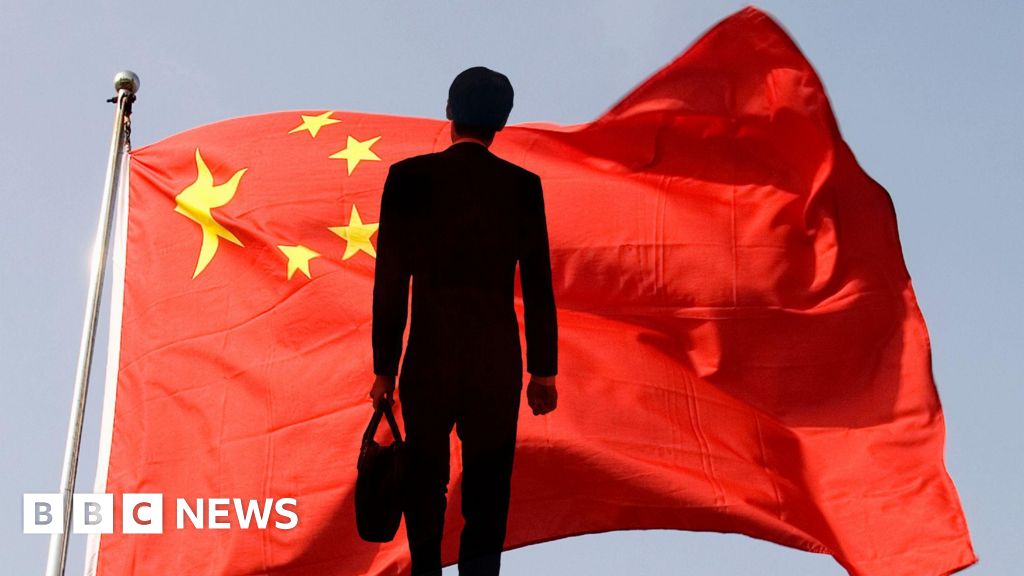spoiler
“Now I think about it, I definitely chose the wrong industry.”
Xiao Chen*, who works in a private equity firm in China’s financial hub, Shanghai, says he is having a rough year.
For his first year in the job, he says he was paid almost 750,000 yuan ($106,200; £81,200). He was sure he would soon hit the million-yuan mark.
Three years on, he is earning half of what he made back then. His pay was frozen last year, and an annual bonus, which had been a big part of his income, vanished.
The “glow” of the industry has worn off, he says. It had once made him “feel fancy”. Now, he is just a “finance rat”, as he and his peers are mockingly called online.
China’s once-thriving economy, which encouraged aspiration, is now sluggish. The country’s leader, Xi Jinping, has become wary of personal wealth and the challenges of widening inequality.
Crackdowns on billionaires and businesses, from real estate to technology to finance, have been accompanied by socialist-style messaging on enduring hardship and striving for China’s prosperity. Even celebrities have been told to show off less online.
Loyalty to the Communist Party and country, people are told, now trumps the personal ambition that had transformed Chinese society in the last few decades.
Mr Chen's swanky lifestyle has certainly felt the pinch from this U-turn. He traded a holiday in Europe for a cheaper option: South East Asia. And he says he “wouldn’t even think about” buying again from luxury brands like “Burberry or Louis Vuitton”.
But at least ordinary workers like him are less likely to find themselves in trouble with the law. Dozens of finance officials and banking bosses have been detained, including the former chairman of the Bank of China.
The industry is under pressure. While few companies have publicly admitted it, pay cuts in banking and investment firms are a hot topic on Chinese social media.
Posts about falling salaries have generated millions of views in recent months. And hashtags like “changing career from finance” and “quitting finance” have gained more than two million views on the popular social media platform Xiaohongshu.
Some finance workers have been seeing their income shrink since the start of the pandemic but many see one viral social media post as a turning point.
In July 2022, a Xiaohongshu user sparked outrage after boasting about her 29-year-old husband’s 82,500-yuan monthly pay at top financial services company, China International Capital Corporation.
People were stunned by the huge gap between what a finance worker was getting paid and their own wages. The average monthly salary in the country's richest city, Shanghai, was just over 12,000 yuan.
It reignited a debate about incomes in the industry that had been started by another salary-flaunting online user earlier that year.
Those posts came just months after Xi called for “common prosperity” - a policy to narrow the growing wealth gap.
In August 2022, China’s finance ministry published new rules requiring firms to “optimise the internal income distribution and scientifically design the salary system”.
The following year, the country's top corruption watchdog criticised the ideas of “finance elites” and the “only money matters” approach, making finance a clearer target for the country’s ongoing anti-corruption campaign.
The changes came in a sweeping but discreet way, according to Alex*, a manager at a state-controlled bank in China’s capital, Beijing.
“You would not see the order put into written words - even if there is [an official] document it’s certainly not for people on our level to see. But everyone knows there is a cap on it [salaries] now. We just don’t know how much the cap is.”
Alex says employers are also struggling to deal with the pace of the crackdown: “In many banks, the orders could change unexpectedly fast.”
“They would issue the annual guidance in February, and by June or July, they would realise that the payment of salaries has exceeded the requirement. They then would come up with ways to set up performance goals to deduct people’s pay.”
Mr Chen says his workload has shrunk significantly as the number of companies launching shares on the stock market has fallen. Foreign investment has decreased in China, and domestic businesses have also turned cautious - because of the crackdowns and weak consumption.
In the past his work often involved new projects that would bring money into his firm. Now his days are mostly filled with chores like organising the data from his previous projects.
“The morale of the team has been very low, the discussion behind the bosses backs are mostly negative. People are talking what to do in three to five years.”
It’s hard to estimate if people are leaving the industry in large numbers, although there have been some layoffs. Jobs are also scarce in China now, so even a lower-paying finance job is still worth keeping.
But the frustration is evident. A user on Xiaohongshu compared switching jobs to changing seats - except, he wrote, “if you stand up you might find your seat is gone.”
Mr Chen says that it's not just the authorities that have fallen out of love with finance workers, it's Chinese society in general.
“We are no longer wanted even for a blind date. You would be told not to go once they hear you work in finance.”
*The names of the finance workers have been changed to protect their identities.
- barrbaric [he/him]·3 个月前



